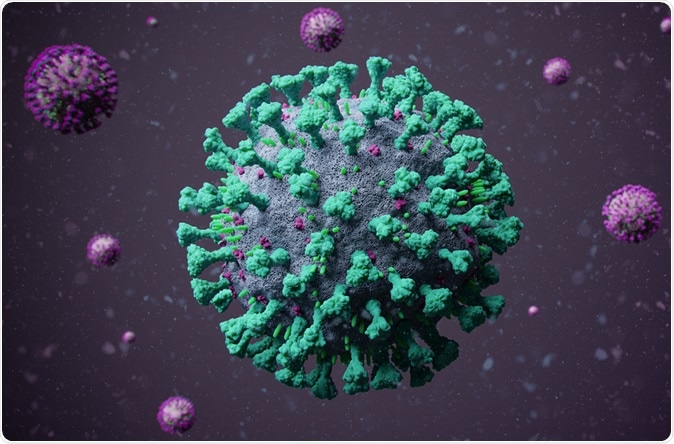Amid the coronavirus pandemic, scientists race to develop a vaccine that can help contain the spread of the virus. The coronavirus disease (COVID-19) has so far infected more than 3.18 million people across the globe. Now, early tests of a potential coronavirus vaccine have shown promise in pre-clinical trials.

SARS-CoV-2 virus particles. Image Credit: Darryl Fonseka / Shutterstock
The university was tapped by the Coalition for Epidemic Preparedness Innovation (CEPI) to use the vaccine facility to develop a vaccine against COVID-19. They teamed up with the Peter Doherty Institute for Infection and Immunity to study the vaccine and its immune response.
The vaccine project has received up to $17 million for its development, which is expected to finish by six months.
"This is what we were hoping for, and it's a great relief for the team given the tremendous faith placed in our technology by CEPI, Federal and Queensland Governments, and our philanthropic partners. We were particularly pleased that the strength of the antibody response was even better than those observed in samples from COVID-19 recovered patients." Professor Paul Young, UQ project co-leader, said.
The vaccine
The University of Queensland developed and tested its COVID-19 vaccine candidate, alongside the Dutch firm, Viroclinics Xplore. The team finished the pre-clinical testing state, which aims to assess the candidates' efficacy in triggering protection against the novel coronavirus.
The university utilized its molecular clamp technology designed to lock the "spike" protein into a shape that the immune system can detect so it can neutralize the virus. The team developed the vaccine in just three weeks and had undergone its formal pre-clinical testing.
The results of the testing show that the vaccine was able to ramp up the levels of antibodies against the SARS-CoV-2. Professor Kanta Subbarao, UQ project co-leader from the Doherty Institute, tested the samples given by the university and discovered high levels of antibodies that can neutralize the infection by the live virus in cell culture.
"This is what we were hoping for, and it's a great relief for the team given the tremendous faith placed in our technology by CEPI, Federal and Queensland Governments, and our philanthropic partners. We were particularly pleased that the strength of the antibody response was even better than those observed in samples from COVID-19 recovered patients," Prof. Young said.
She explained that the effect of the candidate vaccine is akin to the immune responses with SARS vaccines in animal studies, which protected from infection.
Further tests
The team hopes to cope with its timeframe, and they plant to start the clinical trial by early June. From there, if the vaccine is effective, the team can seek U.S. Food and Drug Administration (FDA) approval.
The team says that the race is on for scientists to develop a vaccine to stem the wrath of the coronavirus. While there are no guarantees of success, they work at unprecedented speed to fast track the vaccine development.
The coronavirus disease has already killed more than 218,000 worldwide. The United States is the hardest-hit country with over 1 million confirmed cases and at least 60,000 deaths. Spain, Italy, and France report high case tolls, with more than 236,000, 203,000, and 166,000 confirmed cases, respectively.
While everyone can contract the virus, the high-risk groups include older adults, those with underlying medical conditions, and those who are immunocompromised. However, others should take extra precautions to prevent infection, including practicing social distancing, wearing masks, and washing the hands regularly.